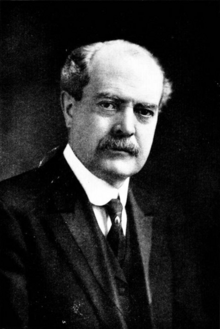Edward Fitzsimmons Dunne
Born in 1853, in Watertown, Connecticut, he was the son of an ardent Irish nationalist, Patrick William (P. W.) Dunne (1832–1921), who emigrated to America in 1849 after the failed Young Ireland revolt.[2] He raised money for the Fenians, gave generously of his own funds, and frequently hosted Irish politicians, political exiles, and rebels in his home when they traveled to Chicago.While sitting in the criminal court on such a rotation, Dunne had originally been assigned to preside over the high-profile trial of Patrick Eugene Prendergast for the murder (assassination) of Chicago Mayor Carter Harrison III On November 6, 1893, Dunne presided over a brief trial session in which the defense attorneys declared that they intended to plead insanity for Prendergast, and asked for a continuance until December 4 on the grounds that they lacked the time to prepare.[5][6] In late 1901, Dunne was one of three judges presiding over a criminal conspiracy case against Illinois Democratic political boss Robert E. Burke.[8] Dunne resigned his judgeship to run for mayor in January 1905, winning election on April 4, 1905, beating the Republican John Maynard Harlan.At the annual Jefferson Day banquet held shortly after his inauguration, he was praised by William Jennings Bryan and Mayor Tom L. Johnson as a dynamic new leader of the national movement for reform.As governor Dunne championed numerous progressive reforms,[15] including Women's Suffrage, prison reforms, major infrastructural improvements, the creation of the Public Utility Commission, the Efficiency and Economy Commission, the Legislative Reference Bureau, and he also expanded the state's responsibility for overseeing workman's compensation benefits and teachers' pensions.In November 1915, Dunne designated state Senator Stephen D. Canady of Hillsboro to appear as his representative on the train car along with the Liberty Bell as it passed through southern Illinois on its nationwide tour returning to Pennsylvania from the Panama-Pacific International Exposition in San Francisco.[18] "In view of the fact that the Ku Klux Klan has adopted the weapon of mass action, it was our desire to organize a society which shall develop harmony and good feeling between different classes, rather than enmity," Mr. Dunne said today."Invitations were sent to many prominent church, political, business and welfare men, and the replies are coming in now...." The Ku Klux Klan, which maintains an office here under the name of the "Southern Publicity Bureau" was called "a menace to this and any community" by former Governor Dunne in their adoption of the "equipment of burglar masks and implements of violence.As part of this commission, Dunne traveled to the Paris Peace Conference of 1919 in order to voice Irish-American desires for an independent Irish nation.His legal practice was damaged by the ravages of the Great Depression, but he supplemented this work with a position as counsel to the Cook County Board of Election Commissioners.[22] President Franklin Roosevelt appointed Dunne to be a United States Commissioner for the Century of Progress World's Fair of Chicago of 1933-34.




Edward Dunne (disambiguation)Governor of IllinoisLieutenantBarratt O'HaraCharles S. DeneenFrank Orren LowdenMayor of ChicagoCarter Harrison IVFred A. BusseCircuit Court of Cook CountyWatertownChicagoCalvary CemeteryDemocraticpolitician24th GovernorIllinoisIllinois circuit courtCook CountyWatertown, ConnecticutIrish nationalistYoung IrelandrevoltcontractorIrish Rebellion of 1798GalwayPeoria, IllinoisFeniansTrinity CollegeDublinRobert EmmetOscar WildeUnion College of LawNorthwestern UniversityOld University of ChicagoCook County Circuit CourtCook County Superior CourtPatrick Eugene PrendergastCarter Harrison IIIplead insanitycontinuanceTheodore Brentanoconspiracypolitical bossCook County state's attorneyA. S. TrudeCharles Martinbribeson April 4, 1905John Maynard Harlantraction issuemunicipal ownershipClarence DarrowWalter L. Fisherpublic utilitiesin 1907Illinois Governor's MansionSpringfield, IllinoisWomen's Suffrage19th AmendmentStephen D. CanadyHillsboroLiberty BellPennsylvaniaPanama-Pacific International ExpositionSan FranciscoParis Peace ConferenceWoodrow Wilsonself-determinationFourteen PointsKu Klux KlanAmerican Commission on Irish IndependenceParis Peace Conference of 1919First DáilGreat DepressionCentury of ProgressChicago Traction WarsChicago TribuneAdlai Stevenson IJ. Hamilton LewisMayors of ChicagoMorrisRaymondF. C. ShermanGarrettA. ShermanChapinCurtissWoodworthGurneeMillikenWentworthHainesRumseyMedillColvinHarrison IIICregierWashburneHopkinsHarrison IVThompsonCermakKennellyR. J. DaleyBilandicWashingtonSawyerR. M. DaleyEmanuelLightfootJohnsonElectionsGovernors of IllinoisColonial administratorsList of commandants of the Illinois CountryTerritorial governorsEdwardsGovernorsReynoldsDuncanCarlinFrenchMattesonBissellYates Sr.